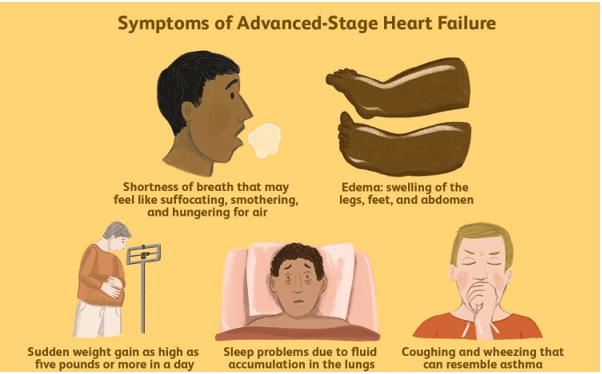A nurse is reinforcing teaching with a client who is starting digoxin therapy to treat heart failure. The nurse should reinforce with the client that which of the following adverse effects is a possible indication of digoxin toxicity and should be reported to the provider?
Blurry vision
Tinnitus
Joint pain
Constipation
The Correct Answer is A
Choice A Reason:
Digoxin can produce alterations in the visual system of patients, such as reduced visual acuity, photophobia, and blurred or yellow vision.
Choice B Reason:
While tinnitus can occur with various medications, it's not a specific symptom of digoxin toxicity.
Choice C Reason:
Joint pain is incorrect. Joint pain is not a common symptom of digoxin toxicity.
Choice D Reason:
Constipation is incorrect. Constipation is not typically associated with digoxin toxicity either.
Nursing Test Bank
Naxlex Comprehensive Predictor Exams
Related Questions
Correct Answer is A
Explanation
a. "I should discuss this document with my family after I sign it"
Advance directives are legal documents that allow an individual to specify the type of medical care they want to receive in case they become unable to make their own decisions. It is important for the client to discuss their wishes with their family members or loved ones so that they are aware of the client's desires and can act accordingly in case of an emergency.
b. "I am not allowed to change my mind once I sign this document" is incorrect. The client can change their mind about their advance directive at any time and for any reason. It is important for the client to review their advance directive periodically and make changes as necessary.
c. "An atorney will need to notarize this document for it to be valid" is also incorrect. While some states require advance directives to be notarized or witnessed, not all states do. It is important for the client to check with their state's laws regarding advance directives to ensure that their document is legally binding.
d. "My partner needs to be present when I sign this document" is not necessarily true. While it is recommended for the client to have a witness present when signing their advance directive, it does not have to be their partner. The witness should be someone who is not a family member, healthcare provider, or beneficiary of the client's estate.

Correct Answer is A
Explanation
Choice A Reason:
Changing a central venous catheter dressing for a client who is receiving IV therapy is correct. Sterile gloves should be used when performing procedures that involve the manipulation of sterile or aseptic areas, such as changing the dressing on a central venous catheter. Maintaining the sterility of the catheter site is crucial to prevent infections in clients receiving IV therapy through central lines.
Choice B Reason:
Instilling an ophthalmic ointment for a client with a corneal abrasion involves applying a medication to the eye is incorrect. While it's important to use clean technique and maintain good hand hygiene, it does not require sterile gloves.
Choice C Reason:
Inserting an NG (nasogastric) tube for enteral feedings is a clean procedure, not a sterile one. Clean gloves are typically used to maintain cleanliness and reduce the risk of infection, but full sterile technique is not necessary.
Choice D Reason:
Administering an IM (intramuscular) injection also does not require sterile gloves. Clean gloves should be used to maintain infection control, but full sterile technique is not needed for routine IM injections.
Whether you are a student looking to ace your exams or a practicing nurse seeking to enhance your expertise , our nursing education contents will empower you with the confidence and competence to make a difference in the lives of patients and become a respected leader in the healthcare field.
Visit Naxlex, invest in your future and unlock endless possibilities with our unparalleled nursing education contents today
Report Wrong Answer on the Current Question
Do you disagree with the answer? If yes, what is your expected answer? Explain.
Kindly be descriptive with the issue you are facing.
